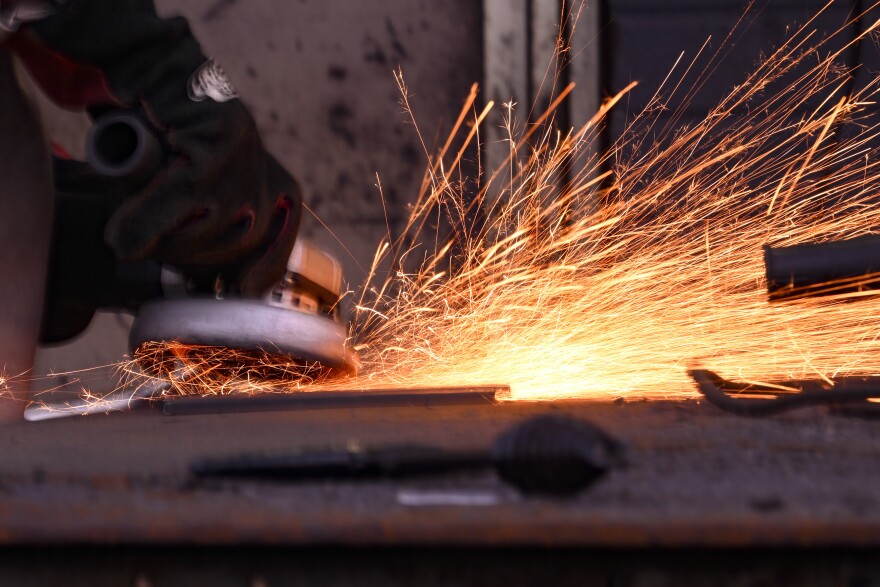The four-year college degree was the dream. For many, it still is. But you’d be surprised by the shift in thinking these days.
While four-year college enrollment more than doubled since 1970, it’s dipped over the last 10 years, more during the pandemic.
Two-year trade schools, meanwhile, are seeing huge increases in enrollment. In 2022, construction students grew 19%, mechanics and repair students by 11%, precision and production students by 17% and culinary students saw a 13% growth.
So what's behind all that growth?
COLLEGE PATHWAYS
The College of Southern Nevada is often utilized as a pathway towards a traditional university education, but it also offers over 180 trade programs for students; ranging anywhere from certifications to two-year degrees.
James McCoy, Vice President of Academic Affairs and Chief Academic Officer for the College of Southern Nevada, said Nevada's growth in the trades is partly due to the economic diversification of the state.
"There are four major industry sectors," said McCoy. "One is our hospitality, tourism, and culinary space. CSN is one of the top culinary programs in the country. Second is in the emerging area of advanced manufacturing. We just built a center for advanced manufacturing, in partnership with the City of Henderson and Haas Automation, where we're developing automation machines."
McCoy continued, "A third is in the area of healthcare, as our population continues to boom, the expansion and dramatic need for nursing and other folks in the allied health space is incredibly provocative. Logistics is another industry sector that is emerging in incredible ways too as we think about the corridor of Las Vegas, the infrastructure, and notion of transporting goods from point A to point B."
Another huge program in CSN's trade belt is their heating, ventilation, air conditioning, and refrigeration certification program, or HVAC-R program. Cesar Lopez is the HVAC-R club president at CSN and has completed a double associate degree in automation. Lopez, who already had experience in HVAC from working on the field before, said CSN blew him away.
"The value of CSN to me is enormous," said Lopez. "The programs they had, it was all really well structured. Since I already had experience on the field, I was evaluating my instructor and seeing how much they knew and how well they were teaching the material. I was blown away, they really knew what they were doing. And second of all, something which I think the most important thing; they really care about the students. They care for them to develop and grow as technicians and help them be successful in the trade."
K-12 INSTITUTIONS
One of the drivers of trade expansion is the growing number of trade programs in K-12 institutions.
The recently opened Southern Nevada Trades High School, is an independent and free charter school focusing on construction, carpentry, and home building. They also offer the academic and college ready-ness curriculum that a traditional high school would.
But, unlike traditional high schools, students can likely find a job in the construction trades upon graduation. Julie Carver, Executive Director for the Southern Nevada Trades High School, said Las Vegas families are interested in the construction trade for their kids.
"We've had very good success with families wanting their child to have an employable skill," said Carver. "We surveyed across Las Vegas and asked if it was important for your student to have a job after they graduate high school and over 90% of the families said yes. This is partly because of the generational debt that people have taken on with student loans. So, we offer students the opportunity to work right out of high school, and they can pay for college and not graduate with a lot of debt, or they can go straight into the trades."
Southern Nevada isn't the only part of the state experiencing a growing interest in the trades. Northern Nevada's Lyon County School District has dramatically expanded their trade programs in their schools within the last few years.
James Gianotti is the executive director of educational services for Lyon County's school district, and he said their trade programs vary across the grades, but carry the same end-goal.
"Our programs are a continuum," said Gianotti. "At the elementary level, work based learning starts with guest speakers. For example, maybe a police officer will come in with his police car and students will get a chance to interview the police officer. In middle school, it starts to be more of an exploration in what they are interested in. In high school, then comes the opportunity to do job shadows or unpaid internships, ultimately leading to placement in business and industry."
Gianotti continued. "We have a large number of students interested in welding, construction, culinary, and we're seeing an uptick in health science as well. The bottom line is many of our graduating students, because they obtain industry recognized credentials while they're going to high school, they're able to walk onto a job site after graduation and get a job."
It is worth nothing that many of the trade programs offered by the Southern Nevada Trades High School and schools part of Lyon County School District offer dual college credits for students who still want to purse a university education. Additionally, there are industries and businesses in Northern Nevada that are willing to pay for continuing education.
Guests: James McCoy, vice president of academic affairs and chief academic officer, College of Southern Nevada; Julie Carver, executive director, Southern Nevada Trades High School; James Gianotti, executive director of educational services; Lyon County School District










